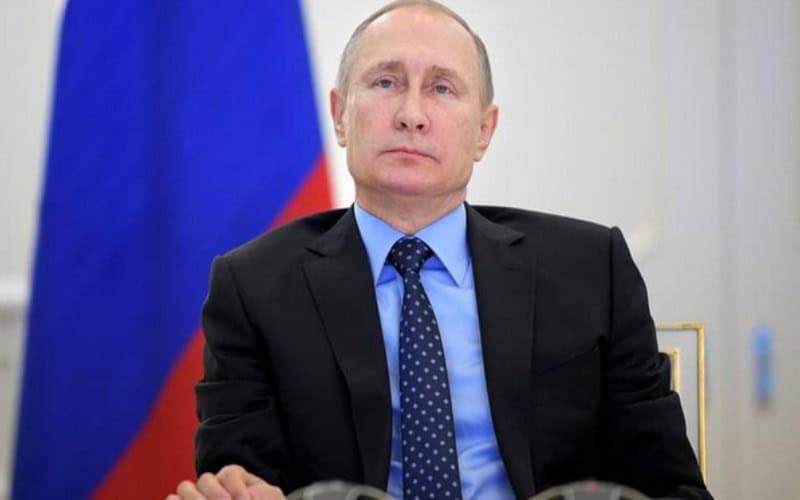Moscow: Russian President Vladimir Putin has removed several opposition figures from his human rights council, a decree published Monday showed, with critics saying the move robs the advisory body of its legitimacy.
The 50-member body, which has spoken out against abuses, has gradually been losing influence and many respected members of the human rights community have already quit in protest at various Kremlin actions.
Five people will be removed from the council including its veteran head Mikhail Fedotov, according to the presidential decree on the government website.
The other four include outspoken political analyst Ekaterina Schulmann who openly supports opposition leader Alexei Navalny, and lawyer Pavel Chikov whose organisation provides legal support to detained political protesters.
They will be replaced by current and former state media employees, among them Kirill Vyshinsky, a journalist at RIA Novosti state news agency who had been jailed by Ukraine and last month flown to Russia in a high-profile prisoner swap.
The council’s new leader, Valery Fadeyev, is a senior member of the ruling United Russia party and worked as a presenter and news anchor on pro-Kremlin Channel One television.
Russian rights campaigners said the decision effectively meant the end of the council as a legitimate advisory body on human rights.
“The council is dead. May it rest in peace,” Grigory Melkonyants, a campaigner for electoral rights, wrote on Facebook.
He suggested the new members were much more likely to agree with the authorities.
Those excluded “always stood up for the law and justice and Putin doesn’t want to keep such advisors,” Lyubov Sobol, an opposition politician and Navalny ally, wrote on Twitter.
News of Fedotov’s imminent dismissal on the grounds that he had reached the age of 70 was first reported last week. Fedotov, a respected figure in human rights circles, has led the council since 2010.
Many of the remaining council members signed a public letter to Putin asking him to keep Fedotov as the head due to his experience and authority.
Putin only occasionally meets with the council though it continued to publish critical statements, most recently over the controversial polls for Moscow parliament.
The council still has several members who have oppositional views, including filmmaker Alexander Sokurov, environmentalist Sergei Tsyplenkov who heads Greenpeace Russia, and anti-torture campaigner Igor Kalyapin.View reactions (54)
has removed several opposition figures from his human rights council, a decree published Monday showed, with critics saying the move robs the advisory body of its legitimacy.
The 50-member body, which has spoken out against abuses, has gradually been losing influence and many respected members of the human rights community have already quit in protest at various Kremlin actions.
Five people will be removed from the council including its veteran head Mikhail Fedotov, according to the presidential decree on the government website.
The other four include outspoken political analyst Ekaterina Schulmann who openly supports opposition leader Alexei Navalny, and lawyer Pavel Chikov whose organisation provides legal support to detained political protesters.
They will be replaced by current and former state media employees, among them Kirill Vyshinsky, a journalist at RIA Novosti state news agency who had been jailed by Ukraine and last month flown to Russia in a high-profile prisoner swap.
The council’s new leader, Valery Fadeyev, is a senior member of the ruling United Russia party and worked as a presenter and news anchor on pro-Kremlin Channel One television.
Russian rights campaigners said the decision effectively meant the end of the council as a legitimate advisory body on human rights.
“The council is dead. May it rest in peace,” Grigory Melkonyants, a campaigner for electoral rights, wrote on Facebook.
He suggested the new members were much more likely to agree with the authorities.
Those excluded “always stood up for the law and justice and Putin doesn’t want to keep such advisors,” Lyubov Sobol, an opposition politician and Navalny ally, wrote on Twitter.
News of Fedotov’s imminent dismissal on the grounds that he had reached the age of 70 was first reported last week. Fedotov, a respected figure in human rights circles, has led the council since 2010.
Many of the remaining council members signed a public letter to Putin asking him to keep Fedotov as the head due to his experience and authority.
Putin only occasionally meets with the council though it continued to publish critical statements, most recently over the controversial polls for Moscow parliament.
The council still has several members who have oppositional views, including filmmaker Alexander Sokurov, environmentalist Sergei Tsyplenkov who heads Greenpeace Russia, and anti-torture campaigner Igor Kalyapin.

